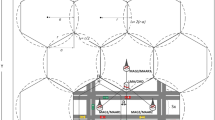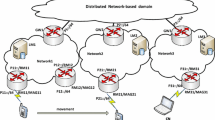Abstract
The drawbacks of centralized mobility management (CMM) schemes, such as scalability, non-optimal routes, and single points of failure, led to the development of a distributed mobility management (DMM) scheme. The new DMM paradigm proposes a flatter system by moving the mobility functionalities closer to the user and distributing the control and data planes at the edge of the access network. The DMM involves two approaches: partially DMM (P-DMM), in which only the data plane is distributed while the control plane is kept centralized, and fully DMM (F-DMM), where both the control and the data planes are distributed. In this paper, we present in detail the design and operation of a proposed F-DMM approach based on the existing PMIPv6 and media independent handover protocols. We have also developed an analytical model used for comparative performance analysis of CMM, P-DMM, and F-DMM. The analytical model includes the signaling cost, data cost, tunneling cost, processing cost, handover latency, and packet loss. The numerical results show that the DMM outperforms the CMM in terms of mobility costs while the proposed F-DMM outperforms CMM and P-DMM in terms of handover latency and packet loss. Moreover, the results obtained prove the advantages of the dynamic mobility support of DMM, where the proposed approach provides better performance for a large number of corresponding nodes.


















Similar content being viewed by others
References
Cisco White Paper. (2014). Cisco Visual Networking Index: Global Mobile Data Traffic Forecast Update, 2013–2018.
Arkko, J., Perkins, C., & Johnson, D. (2011). Mobility support in IPv6. IETF RFC 6275.
Gundavelli, S., Leung, K., Devarapalli, V., Chowdhury, K., & Patil, B. (2008). Proxy mobile Ipv6. IETF RFC 5213.
Seite, P., Liu, D., Yokota, H., Korhonen, J., & Chan, H. A. (2014). Requirements for distributed mobility management. IETF RFC 7333.
Chan, H. A., Yokota, H., Xie, J., Seite, P., & Liu, D. (2011). Distributed and dynamic mobility management in mobile internet: Current approaches and issues. Journal of Communications, 6(1), 4–15.
Zuniga, J. C., Bernardos, C. J., de la Oliva, A., Melia, T., Costa, R., & Reznik, A. (2013). Distributed mobility management: A standards landscape. IEEE Communications Magazine, 51(3), 80–87.
Lee, J., Bonnin, J., Seite, P., & Chan, H. A. (2013). Distributed IP mobility management from the perspective of the IETF: Motivations, requirements, approaches, comparison, and challenges. IEEE Wireless Communications, 20(5), 159–168.
Yi, L., Zhou, H., & Zhang, H. (2012). An efficient distributed mobility management scheme based on PMIPv6. In Innovative Mobile and Internet Services in Ubiquitous Computing (IMIS), 2012 sixth international conference on (pp. 274–279).
Kim, J. I., & Koh, S. J. (2013). Distributed mobility management in proxy mobile IPv6 using hash function. In International conference on information networking (ICOIN), 2013 (pp. 107–112).
Chan, H. A. (2010). Proxy mobile IP with distributed mobility anchors. In GLOBECOM workshops, 2010 IEEE (GC Wkshps) (pp. 16–20).
Ernest, P. P., Falowo, O. E., & Chan, H. A. (2013). Network-based distributed mobility management: Design and analysis. In 2013 IEEE 9th international conference on wireless and mobile computing, networking and communications (WiMob) (pp. 499–506).
Giust, F., De La Oliva, A., Bernardos, C. J., & Da Costa, R. P. F. (2011). A network-based localized mobility solution for distributed mobility management. In 2011 14th International Symposium on wireless personal multimedia communications (WPMC) (pp. 1–5).
Giust, F., Bernardos, C. J., & de la Oliva, A. (2014). Analytic evaluation and experimental validation of a network-based IPv6 distributed mobility management solution. IEEE Transactions on Mobile Computing, 13(11), 2484–2497.
Nguyen, T., & Bonnet, C. (2013). DMM-based inter-domain mobility support for proxy mobile IPv6. In Wireless communications and networking conference (WCNC), 2013 IEEE, 1998–2003.
Lee, J. (2013). PMIPv6-based distributed mobility management. Draft-jaehwoon-dmm-pmipv6-03 (work in progress).
Jeon, S., Figueiredo, S., & Aguiar, R. L. (2013). On the impacts of distributed and dynamic mobility strategy: A simulation study. In Proceedings of the IEEE/IFIP wireless days 2013 (pp. 1–6).
Jeon, S., Kang, N., Corujo, D., & Aguiar, R. L. (2015). Comprehensive performance evaluation of distributed and dynamic mobility routing strategy. Computer Networks, 79, 53–67.
Ali-Ahmad, H., Ouzzif, M., Bertin, P., & Lagrange, X. (2013). Distributed mobility management: Approaches and analysis. In Communications workshops (ICC), 2013 IEEE international conference on (pp. 1297–1302).
Ali-Ahmad, H., Ouzzif, M., Bertin, P., & Lagrange, X. (2014). Performance analysis on network-based distributed mobility management. Wireless Personal Communications, 74(4), 1245–1263.
LAN MAN Standards Committee of the IEEE Computer Society. (2009). Part 21: Media independent handover services. IEEE Standard 802.21-208.
Taniuchi, K., Ohba, Y., Fajardo, V., Das, S., Tauil, M., Cheng, Y., et al. (2009). IEEE 802.21: Media independent handover: Features, applicability, and realization. IEEE Communications Magazine, 47(1), 112–120.
Bernardos, C. J., De la Oliva, A., & Giust, F. (2014). A PMIPv6-based solution for distributed mobility management. Draft-bernardos-dmm-pmip-03 (work in progress).
Korhonen, J., & Devarapalli, V. (2011). Local Mobility Anchor (LMA) Discovery for Proxy Mobile IPv6. IETF RFC 6097.
Ma, Z., & Zhang, X. (2012). An AR-level solution support for distributed mobility management. IETF draft-ma-dmm-armip-00.
Brown, T. X., & Mohan, S. (1997). Mobility management for personal communications systems. IEEE Transactions on Vehicular Technology, 46(2), 269–278.
Akyildiz, I. F., & Wang, W. (2002). A dynamic location management scheme for next-generation multitier PCS systems. IEEE Transactions on Wireless Communications, 1(1), 178–189.
Makaya, C., & Pierre, S. (2008). An analytical framework for performance evaluation of IPv6-based mobility management protocols. IEEE Transactions on Wireless Communications, 7(3), 972–983.
Lee, J., Han, Y., Gundavelli, S., & Chung, T. (2009). A comparative performance analysis on hierarchical mobile IPv6 and proxy mobile IPv6. Telecommunication Systems, 41(4), 279–292.
Kleinrock, L. (1975). Queuing systems. New York: Wiley.
Fang, Y., Chlamtac, I., & Lin, Y. (1998). Channel occupancy times and handoff rate for mobile computing and PCS networks. IEEE Transactions on Computers, 47(6), 679–692.
Lee, J., Ernst, T., & Chung, T. (2010). Cost analysis of IP mobility management protocols for consumer mobile devices. IEEE Transactions on Consumer Electronics, 56(2), 1010–1017.
Lee, J., Gundavelli, S., & Chung, T. (2009). A performance analysis on route optimization for proxy mobile IPv6. In 2009 IEEE international conference on communications. ICC’09 (pp. 1–6).
Magagula, L., & Chan, H. (2008). IEEE802.21 optimized handover delay for proxy mobile IPv6. In IEEE Military communications conference (pp. 1–7).
Song, H., Kim, J., Lee, J., & Lee, H. (2011). Analysis of vertical handover latency for IEEE 802.21-enabled Proxy Mobile IPv6. In International conference on advanced communication technology (pp. 1059–1063).
Magagula, L., Falowo, O., & Chan, H. (2009). PMIPv6 and MIH enhanced PMIPv6 for mobility management in heterogeneous wireless networks. In IEEE AFRICON, Nairobi, Kenya (pp. 1–5).
Melia, T., De la Oliva, A., Vidal, A., Soto, I., Corujo, D., & Aguiar, R. (2007). Toward IP converged heterogeneous mobility: A network controlled approach. Computer Networks, 51(17), 4849–4866.
Author information
Authors and Affiliations
Corresponding author
Rights and permissions
About this article
Cite this article
Murtadha, M.K., Noordin, N.K., Ali, B.M. et al. Design and evaluation of distributed and dynamic mobility management approach based on PMIPv6 and MIH protocols. Wireless Netw 21, 2747–2763 (2015). https://doi.org/10.1007/s11276-015-0950-z
Published:
Issue Date:
DOI: https://doi.org/10.1007/s11276-015-0950-z




